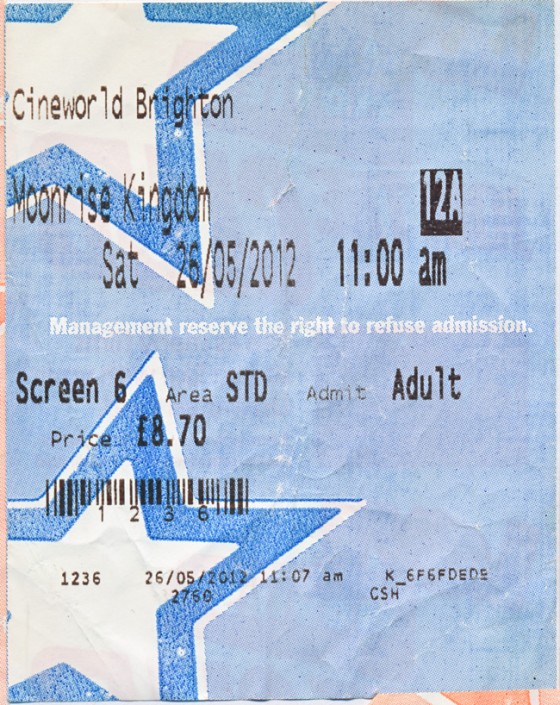Moonrise Kingdom

He kills a dog. Do not see this film.
It feels obvious and cheap to even have an opinion about Moonrise Kingdom, a film I was doomed to see because of the presence of Mr. Bruce Willis. I’m eschewing anger since Mr. Wes Anderson ‘makes films that people feel strongly’ about, and I’m shallow enough not to want to be like everyone else.
Not as shallow as Mr. Anderson, of course, which is not boastfulness on my part, merely re-stating empirical observation. I can’t survive in the vacuum of space, reproduce offspring from a pouch, grow to be six hundred and eighty five feet high or be as shallow as Wes Anderson. It’s a question of physics.
In deference to my failing attempts to remain detached, I can truthfully state that whatever opinion I have is colored by the way in which the films exists in the canon, that How I Spent My Summer Vacation, a solid piece of genre filmmaking would go straight to video and Moonrise Kingdom would go to Cannes. Even if his films were tolerable, and this may be his most tolerable film post Bottle-Rocket, it suffers immensely from its being over-praised and hyped by its various praisers and hypers. Without expectations, it could at least be enjoyed as an unsubstantial mediocrity.
I have to tread carefully here: how do I say Wes Anderson is a sociopath without seeming like I'm making a personal attack?
Ah, that last sentence was perfect.
Insert ‘I said it was his best film’ here, but the film is at least feh. Why, there’s even moments of accidental insight! To be fair, this is the über Wes Anderson film. Like Damsels in Distress, it is where this filmmaker was headed all along. This is neither a compliment nor an insult, though it is mostly an insult. Unlike DiD, Moonrise Kingdom is more akin to Battleship, which one could say is where Mr. Peter Berg was headed all along.
More importantly, like Battleship, Moonrise Kingdom is less a good or even above average film than it is an interesting one. Battleship had had a lot to say about narrative, and Moonrise Kingdom (I’m having difficulty typing that, and want to call it ‘the film’, but that is giving it too much power. Say it out loud, Harry Potter) has a lot to say about about what what the hell it is to be funny. Or, rather pointedly, what it is not to be.
I could say that it’s fine to make an unfunny film, and come up with a good film that lacks levity, but I can’t, because it isn’t, and there hasn’t been. You may enjoy humorless and witless films, God knows the critics do, but Moonrise Kingdom, with its pointedly wacky characters, set-ups and situations is set up to be a comedy, and without a hint of tension or sympathy for the characters to be found, can only succeed or fail on its comic chops. This is only a problem since Moonrise Kingdom is not in any way funny, not even in the cheap mechanical joke-bot style of a Chuck Lorre joint. Nary a smile, nor even the nagging suspicion of the unseen peer pressure that we’re missing the joke. Nothing. I guess I should have seen it at Cannes.
How to explain this? No, really, how to explain it? I said interesting and I meant it, inasmuch as one can actually mean the word ‘interesting’. Why is this film not funny? Three things come to mind: reality, temporal placement and sociopathy.
Well, what was on your card?

I’ve said before that comedy depends on characters that believe in their own reality, and Moonrise Kingdom has those in spades. What’s missing here? I think it’s the reality to which the briefly rational characters to refer.
In other words, it’s fine, even ideal, to populate your film exclusively with mad characters, but the joke must always be about the way in which their world clashes with the real one, and the way in which the other crazy characters have a bead on them (and no awareness of their own insanity). As this film (I just couldn’t say it; sorry Harry) takes place largely between the white spaces of the Esty website, this reality is missing, so when characters are ‘absurd’, or even “‘absurd'”, there’s no clash, and it quickly becomes part of the period correct wallpaper.

At least I saw it with a real audience at the Cineworld Brighton. It was AWESOME not to hear people laugh. To hear people not laugh? To see people leave (really). Awesome.
Let me see if I can explain: early on, and I’m disappointed that this is in the trailer as I would very much like to ruin the film for everyone the planet, we discover that our precocious Mr. Jared Gilman has cut a hole in his tent to escape from whatever they called the Boy Scouts to avoid a lawsuit. Right, the khaki scouts. Oh God, I just realized; he’s not avoiding a lawsuit; he’s embracing a color palette.
Well, we were discussing what it is not to be funny.
Anyway, what’s (potentially) a joke here is that he choose to cut a hole in the tent and cover it like an escaped convict. This gag (sort of) works later when the same character zips up the tent to escape from Mr. Bill Murray, who then promptly lifts the tent into the air; when the belief that the tent is a somehow impenetrable sanctuary finally coincides with Mr. Murray’s reality, it plays because it also coincides with real reality (the first point).
This might be called the Everybody is Right About Something Rule (A Stopped Clock Is Right Twice A Day Unless It’s Digital Rule), that characters can point out each others flaws as they are so obviously blind to their own. But it also works because it’s in the right place – a moment a story is unfolding. If we go back to the earlier dull and irksome scene, instead us seeing the kid working out how to escape a tent he needs only to unzip, we are presented instead with Mr. Edward Norton examining the hole and proclaiming, ‘He’s flown the coop’, as if the act of being period precious is somehow the same as making a real joke.
In regards to placement, our second thesis, it occurred to me here that I was seeing all the parts of the film that don’t matter. So this, I said, is is where all the boring parts that Elmore Leonard left out went to die.
It’s strange to think that most critics would agree with me; that Mr. Anderson is showing us the everyday! And, not unlike The Bible and Das Kapital, by virtue of his being incompetent and contradictory, Mr. Wes Anderson allows his minions to read whatever they will into it. I give you one of my many arch-nemesi: Ms. Manola Darghis, who seems to be attempting to best Mr. Anderson in preciousness:
A marvel of choreographed motion, machine and human, this overture introduces the Bishops, suggesting who they are and what they’re like (the books indicate that this is a reading family), and some crucial leitmotifs. A pair of binoculars points to the coming adventure (and suggests a far-reaching vision), and a kitten alludes to the vulnerability of the future adventurers.
I know. I promised I’d stop doing Manhola Dargis parodies. My apologies.
The preceding paragraph is irksome enough, but it is simply incorrect. There is no vulnerability here; and this is the third reason that this film is not funny. I have to tread carefully here: how do I say Wes Anderson is a sociopath without seeming like I’m making a personal attack?
Ah, that last sentence was perfect. And here I am, always making fun of the pointedly neutral phrasing of sociopathic newscasters.
If I was to write a single paragraph about this film, and since I have to maybe I’ll do it now: Warning: Wes Anderson kills a dog for no reason in Moonrise Kingdom. Boycott this movie. Would have done so myself, had I known.
That’s out of the way, let’s explore this further. Obviously I’m not saying that movies can’t kill dogs or children (see The Grey, which is a great film that really isn’t that funny. Crap, just proved myself wrong. Feh, who remembers ten paragraphs ago). Generally speaking, the senseless murder and mutilation of innocents is purvey of action films, (see the Road Warrior rule, of which I am a firm believer).
That being said, it can, yes, be funny. Anyone who’s seen Postal knows that the only funny moment in Mr. Uwe Boll’s ‘comedy’ is the seen where children are senselessly shot. Why? Because Mr. Boll is a terrible, terrible filmmaker, and, unable to direct even the simplest scene, was equally unable to conceal that the kid actors were having a blast waiting for the squibs to go off, close their eyes and jump.
Mr. Anderson, as a ‘good’ filmmaker, kills the dog and provides us with the following insight:
Aww, flat affect and a total lack of empathy. Why, that’s just what a future mass murderer would say.
Kill a dog, don’t kill a dog (don’t kill a dog, by the way), what this indicates is a deep structural problem for comedy; vulnerability is funny. The uber-designed universe, the proscenium staging, the prioritization of cutesy bits of business over honest observation, every move is calculated step back, like an astronomer who builds the biggest telescope in the world only to turn it around.
And no, I’m totally sure if that made sense, but, like Mr. Anderson, I just like the image. When you combine all these distancing devices with pretty decent actors struggling to find something human within them, the total effect comes off as cruel.
Is Mr. Anderson (or Mr. Roman Coppola, as the co-writer) a sociopath? Probably, but this doesn’t have to be judgmental. Sociopathy, and its attendant lack of anything but robotic insight, may lead to deeply unfunny films, and certainly he should be banned from all artistic pursuits.
But everyone has a role to play in this great big blue marble, and maybe we can just say that Mr. Anderson has missed his calling. Some stewardesses from a French-themed propeller airline would have to be tastefully, but dispassionately, strangled by vintage knitwear, but eventually Morgan Freeman would figure it all out and we’d be safe from Wes Anderson once again. That’s a movie I would see.
Well, in the 90s. If it had Ashley Judd.
The Take

-$45.50
The Lonely Comments Section

 [logo]
[logo]
